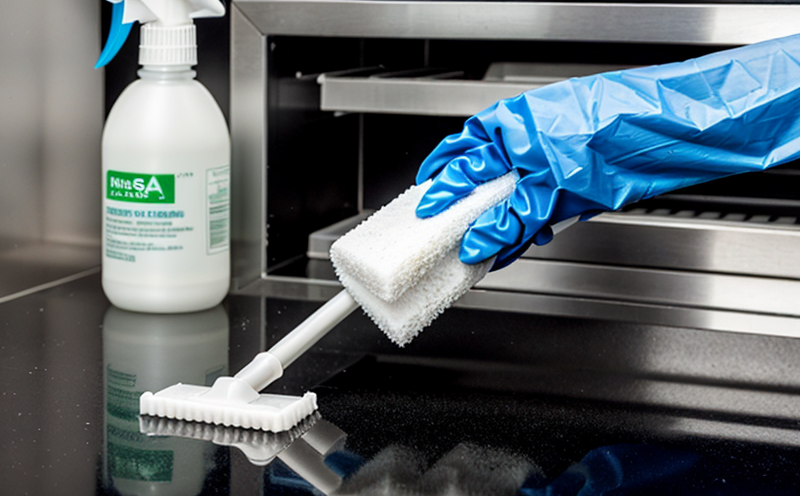EN 14562 Yeasticidal Activity Testing of Plastic Hygiene Products
The European standard EN 14562 specifies a method for the determination of yeasticidal activity of plastic hygiene products. This test is crucial in ensuring that personal care and hygiene items, such as toothbrushes, combs, and other similar objects made from plastics, effectively eliminate or inhibit the growth of harmful yeasts on their surfaces.
This standard applies to a wide range of plastic materials commonly used in hygiene products. It is particularly relevant for those materials that come into direct contact with human skin or mucous membranes. The test measures the effectiveness of these products in reducing yeast populations, which can be crucial in preventing infections and maintaining overall hygiene.
The testing procedure involves exposing the plastic samples to a standardized yeast inoculum under controlled conditions. The samples are then incubated for a specified period, after which they are inspected for any residual yeast colonies. The results provide insights into the product's ability to maintain hygiene standards, ensuring consumer safety and satisfaction.
The methodology outlined in EN 14562 is designed to ensure consistency across different laboratories, allowing for accurate comparisons of products' performance. This standardization is essential for regulatory compliance and market acceptance.
Understanding the specifics of this test helps quality managers and R&D engineers in their product development processes. For procurement teams, it ensures that they are selecting suppliers who adhere to high hygiene standards. The testing protocol can also be a critical tool during the design phase, helping to identify potential material issues early on.
The process typically involves several steps:
- Sample preparation: Carefully select and prepare representative samples of the plastic hygiene products.
- Inoculation: Apply a standardized yeast inoculum to the surfaces of the prepared samples.
- Incubation: Place the samples in an incubator set at specific temperature conditions for defined durations.
- Evaluation: Inspect and quantify any residual yeast colonies on the sample surfaces after incubation.
The acceptance criteria are stringent, ensuring that products meet hygiene standards. Products failing to meet these criteria may not be considered safe for use in personal care or hygiene applications.
This testing is particularly important for companies operating within the healthcare and cosmetics sectors. Compliance with EN 14562 helps these businesses adhere to international standards and enhances consumer trust in their products. The test results can also play a significant role in regulatory compliance, ensuring that products meet legal requirements in various markets.
In summary, the EN 14562 standard is an essential tool for manufacturers of plastic hygiene products aiming to ensure product safety and effectiveness. By adhering to this standard, companies not only enhance their market reputation but also contribute to public health by providing safer personal care items.
Applied Standards
The primary applied standard for this test is EN 14562. This European standard provides a comprehensive framework for determining the yeasticidal activity of plastic hygiene products, ensuring that all tests conducted are consistent and reliable.
In addition to EN 14562, other relevant standards include ISO 11733, which deals with similar microbial reduction testing methods. These international standards ensure that the methodologies used in different laboratories across various countries align closely, facilitating global trade and cooperation.
The application of these standards is crucial for ensuring product reliability and consistency. Compliance with these standards helps manufacturers meet regulatory requirements and gain market acceptance. It also ensures that products perform consistently under a variety of conditions, enhancing their effectiveness and safety.
Why Choose This Test
The EN 14562 test is indispensable for manufacturers of plastic hygiene products who aim to ensure the highest standards of hygiene. By choosing this test, companies can demonstrate their commitment to public health and safety.
This testing ensures that plastic items, such as toothbrushes or combs, effectively eliminate harmful yeasts from contact surfaces. This is particularly important for items that come into direct contact with human skin or mucous membranes, where the presence of harmful microorganisms can lead to infections.
The test results provide valuable insights into a product's performance, helping manufacturers identify and rectify any issues early in the design phase. This proactive approach not only enhances product quality but also reduces the risk of recalls and legal challenges.
Compliance with this standard is essential for companies operating within regulatory frameworks that mandate hygiene standards. It ensures that products meet international benchmarks, enhancing marketability and trust among consumers.
Moreover, choosing this test can lead to significant cost savings in the long run by reducing waste from non-compliant products and avoiding costly rework or recalls. The testing process also supports continuous improvement initiatives, ensuring that products remain competitive in a rapidly evolving market.
Environmental and Sustainability Contributions
The EN 14562 test not only ensures the hygiene of plastic hygiene products but also contributes to environmental sustainability. By ensuring that these products effectively eliminate harmful yeasts, manufacturers can reduce the need for frequent replacements due to microbial contamination.
This reduction in waste is particularly beneficial from an environmental perspective, as it minimizes the amount of discarded plastic items ending up in landfills or oceans. The use of hygienic plastics that pass this test also supports the circular economy by promoting the reuse and recycling of these materials.
Moreover, manufacturers who adhere to EN 14562 can position themselves as leaders in sustainable practices, appealing to environmentally conscious consumers and stakeholders. This reputation enhances brand loyalty and market share, contributing positively to corporate social responsibility goals.
The test results also provide data that can be used for life cycle assessments (LCAs) of plastic hygiene products. LCAs are essential tools for understanding the environmental impact of products throughout their lifecycle, from raw material extraction to disposal. By incorporating EN 14562 results into these analyses, manufacturers can make informed decisions about sustainable practices and innovations.





